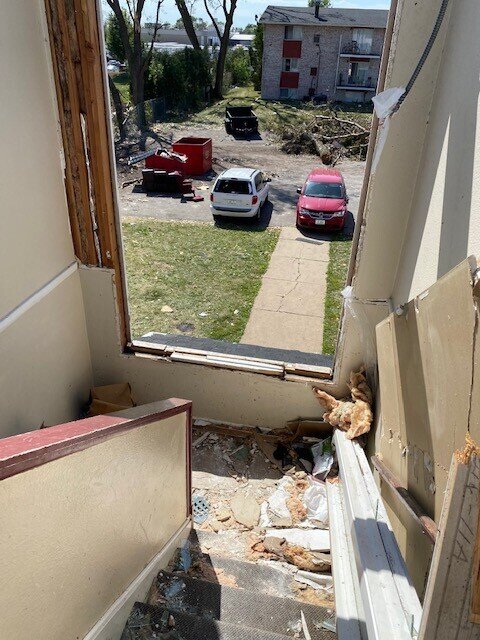‘They were failed’
Des Moines volunteers see firsthand the destruction and need at Cedar Rapids apartments
Photos submitted by Aubrey Alvarez
Four days after straight-line winds slammed Iowa, Des Moines resident Nancy Mwirotsi received a phone call. The woman on the phone asked her to drive to Cedar Rapids the next day.
“‘I think some of our African refugees need help,’” Mwirotsi recalled being told.
The full scope of damage to Cedar Rapids was not yet clear. At this point, volunteers across the city were clearing debris, and Iowans who had power were relaying updates from energy companies to neighbors and family without power who could access cellphone reception. Very few people outside of the majority African immigrant and refugee community at Cedar Terrace Apartments realized how critical the destruction was -- and no one had yet arrived to help.
Three days after Mwirotsi gathered immediate relief efforts for the residents of Cedar Terrace and two other apartment complexes, families are finally transitioning to short-term shelters, where they could sleep indoors, use functioning toilets and access safe food. But it took nearly a week of sleeping outside, in some cases with visible untreated injuries after the apartment roof collapsed on families inside during the Aug. 10 storm.
“They were failed,” Mwirotsi later said.
Now the work begins as the volunteer force assesses ongoing shelter, food and other needs to create sustained aid for families.
First responders
On Aug. 15, Mwirotsi gathered three cars of friends and about $1,500 worth of Sam’s Club purchases to drive to Cedar Rapids, mostly guessing at the highest priority needs: water, food, snacks for children, assorted other items. Cedar Rapids resident Eric Engelmann brought 1,000 pounds of ice.
Within 10 minutes of the first volunteer car arriving at Cedar Terrace, all of the supplies were gone, Mwirotsi said. The only thing they had left to offer was hamburgers -- so they set up the grill and got to work with 600 patties. Mwirotsi, Des Moines resident Robert Nishimwe, Cedar Rapids residents Rama Muzo, Pastor Sylvain and Euphrasie Lukama, and two volunteers who traveled from Houston, Texas, interpreted for families, who spoke mostly Swahili among a few other African languages. The complex also housed Haitian families, who speak French.
Guessing how many residents the team served on Saturday is difficult. Online, Cedar Terrace Apartments alone advertises 84 units, although Mwirotsi and Nishimwe knew of at least one seven-person family living in a two-bedroom unit.
“When the storm and the wind occurred, the roof collapsed on them,” Nishimwe said.
That family received medical care after the roof caved, but other families had to wait much longer, Nishimwe said. A mother with 7-week-old twins and another mother with a 1-week-old baby were also among the displaced. About four families had tents to sleep in. And by Sunday, Aug. 16, the volunteers knew of at least seven other apartment complexes damaged in the storm that housed refugee or immigrant families.
Des Moines volunteers returned that Sunday with seven cars of supplies and volunteers, personal care items, flashlights, hand sanitizer, masks and a larger network through social media that was pushing requests for assistance out to the broader community, particularly through the Iowa Derecho Storm Resource Page on Facebook, Mwirotsi said.
Cedar Rapids neighbors also began showing up independently to help at the apartments, despite lingering damage and power outages at their own homes and businesses. Teachers and administrators from Hoover Elementary School in Cedar Rapids arrived; representatives from the Catherine McAuley Center coordinated aid requests to disaster responders; representatives from the Intercultural Center of Iowa assisted with interpretation and aid dispersal.
“The only people who were there were people from the community. It was churches, pastors, and it seems like it just spread through social media,” said Des Moines volunteer Aubrey Alvarez.
Black Lives Matter Des Moines transported donations they had already collected over the summer for homeless families, said BLM organizer and Urban Dreams intern Jaylen Cavil.
“It was a lot to see -- describing it doesn’t do it justice unless you were there on the ground,” Cavil said. “People were out here desperate, needing help. … It’s definitely, I believe, a failure of government.”
Aid was still limited, however -- two portable toilets had arrived for the whole Cedar Terrace complex on Aug. 16. Volunteers were told to bring donations and food to designated county shelters, but they chose to return directly to the apartments, where families’ cars were too damaged to transport anyone.
“The message we kept getting was, ‘We need to be patient and let the system work out,’ and I appreciate that it was very much a mess,” Alvarez said. But without volunteers distributing supplies on the grounds, she asked, “Who knows how long they would have waited?”
A lack of internet and communication also kept families from knowing where shelter services were set up, or what they were: Nishimwe was shocked after speaking to one man who thought emergency shelters would be a jail to be held at, rather than a resource residents could voluntarily enter or leave. By 8 p.m. on Aug. 16 after a Linn County supervisor arrived, some residents were finally being moved to hotel rooms and other emergency shelters, although many were still on-site.
“There were some residents who were really angry. They had seen people show up with video cameras and talk about the damage, and then they didn’t help anybody,” Alvarez said. “These were recently settled refugees, so it was kind of trauma on top of trauma on top of trauma.”
What happens next
Volunteer organizers are now working with the Intercultural Center of Iowa and the Iowa Department of Human Services to develop a standardized needs assessment, dedicated to keeping track of residents as they are moved through shelters and keeping them connected to basic supplies such as diapers, water and blankets. Assessments will be carried out by volunteer interpreters who have the cultural competency to build trust with families, Mwirotsi said.
Supplies and financial aid keep coming through volunteer networks: a delivery led by Rep. Ako Abdul-Samad brought $1,000 worth of supplies on Aug. 23; a delivery led by Sen. Claire Celsi on Aug. 27 brought more than $2,000 in supplies from Costco. Friends and strangers on Facebook turned to digital transactions on Venmo to raise more funds, allowing organizers to rent storage units in Cedar Rapids so families could store salvaged possessions safely while staying in emergency shelters and hotel rooms.
As of Sept. 3, a GoFundMe organized to provide aid through the Intercultural Center of Iowa raised $5,835 out of its $10,000 goal, and private citizens made more than 50 purchases from a public Amazon Wish List, shipping supplies directly to Cedar Rapids for distribution.
[Disclaimer: Business Record reporter Kate Hayden is involved with organizing some fundraising.]
Now a month after the derecho hit on a quiet Monday, families still need permanent housing, new furniture and mattresses -- and for some, new jobs after workplaces closed.
“It’s more than surviving the next week. It’s more about transitioning them into a path for success, because if we just plan for next week, who’s going to plan for the week after? We need to be able to plan for success for them,” she said.
Questions remain around the apartment complexes’ code compliance and fitness to house families before the disaster struck. Cedar Rapids’ department of development services confirmed to the Des Moines Register that Cedar Terrace Apartments had not been inspected by the city for five years.
The disaster highlights what happens when communities lack an emergency management plan for low-income housing, volunteers said.
“When you’re thinking about your elected officials and the housing decisions that [they’re] making, are you making sure that the folks you are electing are keeping in mind the different living conditions of people in the city -- so the next time we have a disaster happen and there is damage, it will not happen to the degree that it did?” Nishimwe said.
“That whole city looks like a bomb went off. That whole city is going to take a long time to recover,” Alvarez said. “We can tailor our responses to those who don’t ... know the language, they don’t know the systems, and [aid] can get there first. … As a city, as a community, focus on where the needs are the highest and more urgent.
“That’s what this pandemic and this disaster has shown. People who are already struggling get pushed farther and farther back into the margins,” she added.



